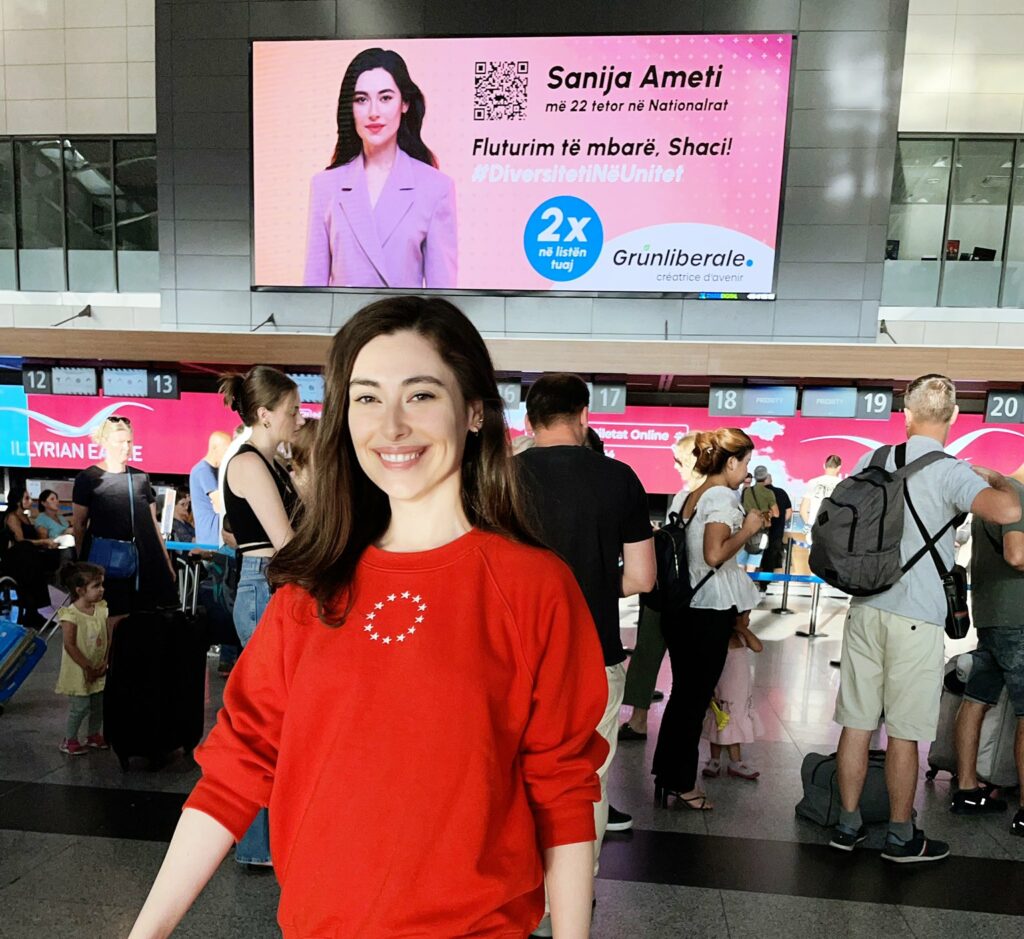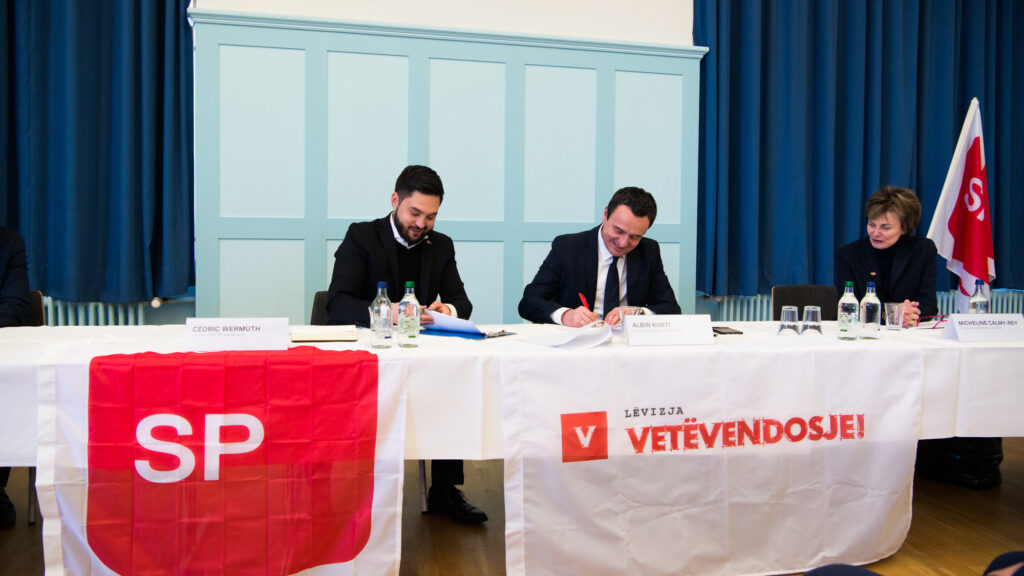As the Swiss Federal Elections approach in late October, candidates from across the political spectrum, including the right-wing conservatives, actively court the Kosovar community as potential voters for their respective parties.
Sanija Ameti beams from a metre-high billboard at the airport in Kosovo’s capital Pristina. The green-liberal politician wishes travelers a good flight – in Albanian. The billboard reminds them to put Ameti’s name on the ballot paper when they vote in next month’s federal elections.
Ameti is not running in Kosovo, but for the Swiss House of Representatives. The 31-year-old local councillor for Zurich wants to go to Berne. Yet she fired the starting shot for her election campaign hundreds of kilometres away from the Swiss capital.

Sanija Ameti in front of her campaign poster in Kosovo. Photo courtesy of Sanija Ameti.
Around 250,000 people of Kosovar origin live in Switzerland. They form one of the largest groups of foreigners in Switzerland. Every year, hundreds of them apply for naturalisation. According to the Federal Statistical Office, since 2018 nearly 15,000 Kosovars have received the red passport. In 2021, 33,000 Swiss-Kosovar dual citizens were living in Switzerland – only people from Germany, Italy and France are naturalised at a higher rate.
In past election years, the Kosovar community was not an issue for campaign strategists. This is now changing.
Ameti, who as a child fled the former Yugoslavia with her family, is not the only person to have noticed this: the votes of the Kosovar diaspora could be decisive in these elections. Other parties also want to mobilise the Swiss Kosovars for their own benefit.
Support for the Social Democrats
The Social Democrats are even receiving official support from Kosovo itself. The Kosovar ruling party Vëtëvendosje, a sister party of the Social Democratic Party, promised in January – in the presence of Kosovar Prime Minister Albin Kurti and former Swiss foreign affairs minister Micheline Calmy-Rey, as well as party co-president Cédric Wermuth – to support the Social Democrats in the upcoming elections. That support could certainly benefit the Kosovar candidates of the Social Democratic Party, since Vetëvendosje enjoys great popularity among the Kosovar diaspora in Switzerland.

Kosovo PM Kurti signing an agreement with SP, “pledging to deepen our inter-party cooperation in areas of common interest, especially socio-economic development, diaspora engagement, education and political dialogue”, as Kurti wrote on X. January 19, 2023. Photo courtesy of PM Kurti social page.
No other Swiss party has more candidates with a Kosovar background than the Social Democrats. Arbër Bullakaj from St Gallen, for example, is running in the parliamentary elections for the second time. He is a prominent champion of his party who fights with popular initiatives for the strengthening of the civil rights of the migrant population in Switzerland.
Ylfete Fanaj was the first Swiss-Kosovar to be elected to a cantonal government in 2023. Fanaj, who came to Switzerland at the age of nine with her Kosovar parents and is a politician for the Social Democratic Party, has been a member of the Lucerne cantonal government since May 14 and is a role model for many migrant politicians in Switzerland.
The Green Party also wants to bring migrant voters to the polls, telling SWI swissinfo.ch they rely on specific election appeals in different languages on social media. In terms of content, says Green Party secretary-general Rahel Estermann, the party wants to win over voters with its open migration and asylum policy, thanks to which “many people with a migration background found their way to Switzerland in the first place, especially from Kosovo.”
Gzim Hasanaj, who is running in the canton of Basel Country and who in January 2023 became the first Green politician of Kosovar origin to make it into the cantonal parliament, wants to represent the Greens in the House of Representatives.
Swiss People’s Party also in on the act
None of the Swiss parties officially records the migration background of their members. However, when asked, all six major parties – the Social Democrats, Greens, Green-Liberals, The Centre, Radical-Liberals and the Swiss People’s Party – confirm that their lists include candidates with an immigrant background, including some of Kosovar origin. However, it’s impossible to know exactly how many of them there are on each party’s lists.
It is therefore not surprising that it is not only the left that is now courting votes from the Kosovar diaspora. The right-wing conservative People’s Party responded to Sanija Ameti’s summer offensive at Pristina’s airport aimed at the so-called Shacis (Kosovars in Switzerland) with a guest article in the Swiss tabloid Blick.
In the article, People’s Party parliamentarian Fredi Heer wrote that his party was much more likely to represent the concerns of Swiss Kosovars than Ameti’s Green-Liberals: “Many Swiss with a Kosovar Albanian background will vote for the People’s Party in October, because it stands up for the middle class and trade.”
Heer’s media counter-attack in turn triggered indignation among several politicians with a migrant background. After the People’s Party had spent years campaigning against Kosovars in Switzerland, it was cynical to now try to win them over as voters, they argued. In 2011, the People’s Party released an ad during the federal election campaign with the slogan “Kosovars are cutting the Swiss apart”. The Federal Court convicted the then secretary-general of the party and his deputy in 2017 of racial discrimination for the ad.
“I personally didn’t think that campaign was smart either,” Heer tells SWI swissinfo.ch. He stands by his position: “Many migrants, including Kosovars, share our values,” he says.
While the Social Democrats, Greens and Green-Liberals promise more liberal civil rights, equal opportunities and less discrimination, the centre-right parties put the incentives elsewhere. The Radical-Liberals and Centre say they are not campaigning specifically for Kosovar Swiss or other migrant communities in Switzerland.
“Our cosmopolitan and economically liberal profile, as well as our commitment to freedom and a tolerant society, is attractive to many people,” writes Marco Wölfli, the Radical-Liberals’ communications manager. It sounds similar to The Centre. “We focus on substantive issues that concern the population as a whole, regardless of origin,” says Thomas Hofstetter, co-head of communications for the party.
These are values that definitely resonate with members of the Kosovar community. Among others, Përparim Avdili, who has presided over the Radical-Liberal party in Zurich since 2022, wants to run for a seat in Bern. Majlinda Sulejmani in canton St Gallen is running for The Centre. Sulejmani is also the first Muslim woman to run for her party.
Optimistic diaspora
Hilmi Gashi is head of migration and interest groups at the trade union Unia and a member of the Muri-Gümligen municipal parliament for the Green Party in canton Bern. For years he has been campaigning for the integration and participation of the Kosovar diaspora in Swiss politics. He is observing this year’s national elections with great interest and notes: “Even away from the left-wing parties, it is noticeable that there are strenuous attempts to exploit the voter potential of the Swiss Kosovars.”
The new wave of participation of the Kosovar community in Swiss politics is positive but does not surprise him: “It’s not that the Kosovar community wasn’t political before.” Many Kosovars have changed their focus in recent years: their political gaze shifted from their homeland to their new home with the declaration of independence of the Kosovar state in 2008, says Gashi.
Gashi considers the chances of the Swiss-Kosovar candidates to be slim. The competition should not be underestimated: “Despite the will to shape the future, good campaigns and political biographies, the air is getting thinner towards the top.” Political analyst and book author Mark Balsiger draws a similar balance: “Success stories like that of the newly elected Lucerne government councilor Ylfete Fanaj give hope. But a lot of time will pass before elections like hers are normal. Swiss politics lags behind social reality.”
Within the Kosovar community, however, there is optimism. “All roads lead to Berne“ was the headline of the diaspora magazine Albinfo’s April issue. On September 10, the magazine organised a panel discussion in Zurich with the candidates Islam Alijaj (Social Democrat), Reis Luzhnica (Social Democrat) and Përparim Avdili (Radical-Liberal). The topic of the panel discussion was the political participation of the Kosovo Albanian community in Switzerland.
This article was initially published in Swissinfo.ch.





